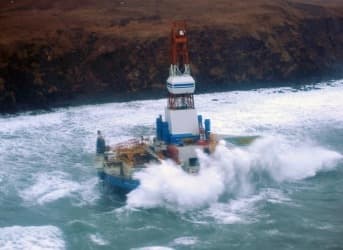On April 3, the Coast Guard published the findings of an investigation of the grounding of Royal Dutch Shell’s drilling ship on the Alaskan coast a year and a half ago. The report found that Shell recklessly sought to move its ship during bad weather in order to avoid paying taxes to the state of Alaska. Shell would have owed several million dollars in taxes if it remained within state boundaries beyond December 31st, 2012. The 152-page report finds that “ineffective” risk management contributed to the grounding of the ship on that date as Shell tried to rush to beat the midnight deadline.
In a letter explaining the findings, USCG Rear Admiral Joseph Servido wrote “(I'm) most troubled by the significant number and nature of the potential violations of law and regulations identified in the Enforcement section of the investigative report, including the failure to report marine casualties, failure to report safety-related vessel issues and improper/illegal bridge and engine room watch-keeping systems.” Apparently, the Aiviq – the ship towing the Kulluk rig – was involved in several incidents that went unreported, including a blackout and engine failure. He went on, “I am additionally troubled by the potential evidence of negligent conduct by master, chief engineer, and third mate aboard,” referring to the Aiviq.
Also, the report found that while the towing crew had experience towing in prior missions, they had done so in warmer climates and they were not prepared to operate in the harsh conditions in the Gulf of Alaska.
The master of the Aiviq appeared to be aware that the weather was bad before the ship set out to tow the Kulluk to its destination in Washington State. The master’s name was redacted, but the Coast Guard found that he sent an email more than a week earlier describing his concerns about moving safely at that time of year. “To be blunt I believe that this length of tow, at this time of year, in this location, with our current routing guarantees an ass kicking,” he wrote.
Yet, they tried to do it anyway. The trip was supposed to take two weeks from Dutch Harbor Alaska to a harbor in Washington. Stormy weather near Kodiak Island broke the tow line between the two ships and the Aiviq’s engines broke down. The Kulluk ran aground on New Year’s Eve, going a long way to killing off Shell’s ambitious plans for Arctic drilling. The Coast Guard report gives ammunition to Shell’s critics, who argue that no company, including one that is as technologically sophisticated as Shell, is ready to drill in the Arctic.
Shell said it is reviewing the Coast Guard’s investigation. “We appreciate the U.S. Coast Guard’s thorough investigation into the Kulluk towing incident and will take the findings seriously,” a Shell spokesperson said.
Damning as the report may be, it may not matter much. Shell has already dramatically scaled back its Arctic objectives since the Kulluk ran aground. Shell cancelled drilling plans in 2013 and announced earlier this year that they are again shelving drilling plans for 2014. And the future remains in doubt – Shell said it hasn’t yet decided what it will do in 2015 and beyond. Perhaps just as important, Shell has new management, and CEO Ben van Beurden has declared that he will steer the company away from high-risk, expensive oil fields, which suggests that the Arctic could be at the top of his kill list. The company is in the midst of a multi-year $15 billion divestment campaign to shrink the company and create leaner operations.
By Nicholas Cunningham of Oilprice.com


















